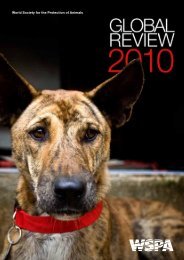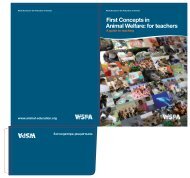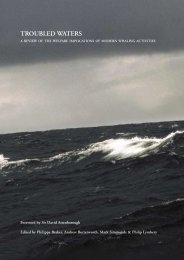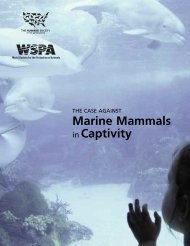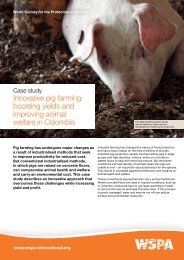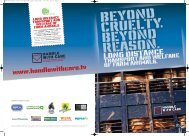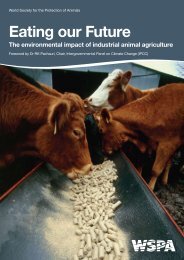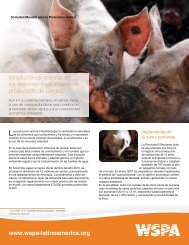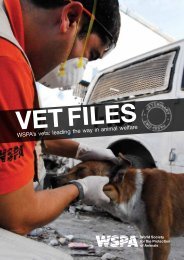Proceedings of the Untangled symposium: - WSPA
Proceedings of the Untangled symposium: - WSPA
Proceedings of the Untangled symposium: - WSPA
Create successful ePaper yourself
Turn your PDF publications into a flip-book with our unique Google optimized e-Paper software.
2Executive summaryThe issueMarine debris (also known as marine litter) is a trulyglobal problem gaining increasing attention and concernaround <strong>the</strong> world. Perhaps more commonly described asan environmental issue, <strong>the</strong> littering <strong>of</strong> our oceans alsohas disastrous consequences for <strong>the</strong> individual animalsliving <strong>the</strong>re, debilitating, mutilating and killing millions <strong>of</strong>birds, whales, dolphins, turtles and o<strong>the</strong>r marine wildlifeevery year.Defined by <strong>the</strong> Honolulu Strategy as ‘any anthropogenic,manufactured, or processed solid material (regardless<strong>of</strong> size) discarded, disposed <strong>of</strong>, or abandoned thatends up in <strong>the</strong> marine environment’ 1 , marine debriscan describe items as small as micro-plastic granulesor as large as shipping containers. From <strong>the</strong> scientificand grey literature summarised in <strong>WSPA</strong>’s <strong>Untangled</strong>report (2012), it is clear that certain types <strong>of</strong> marinedebris cause significant welfare problems for marineanimals. Fishing rope, nets and line, packing bandsand straps and plastic packaging can all entangleanimals, causing a range <strong>of</strong> problems including injuryand restricted movement and reduced feeding ability.These problems may persist for months or even years,in many cases eventually causing death due to infection,drowning or starvation. O<strong>the</strong>r types <strong>of</strong> litter, suchas plastic bags and cigarette lighters, are ingested,suffocating animals, preventing <strong>the</strong>m from feedingand causing internal injuries. This animal suffering issignificant, large-scale and avoidable.<strong>WSPA</strong> is developing a global campaign which aims tomake <strong>the</strong> oceans a safer home for animals – one in which<strong>the</strong>y are no longer at risk <strong>of</strong> being killed or injured byour dangerous debris. At a time when <strong>the</strong> environmentalimpacts <strong>of</strong> marine debris are gaining increasing globalinterest, <strong>WSPA</strong> believes it is also important to bringanimal welfare to <strong>the</strong> forefront <strong>of</strong> solution-focuseddiscussions. This goal was a primary motivation behindholding <strong>the</strong> <strong>symposium</strong>, providing its <strong>the</strong>me.1 A global framework for <strong>the</strong> prevention and management <strong>of</strong> marine debris,United Nations Environment Programme and National Oceanic andAtmospheric Administration <strong>of</strong> <strong>the</strong> United States. http://5imdc.files.wordpress.com/2011/03/honolulustrategy.pdf(accessed February 2013).The <strong>symposium</strong><strong>Untangled</strong> brought toge<strong>the</strong>r over 60 experts from a range<strong>of</strong> backgrounds. The rich diversity <strong>of</strong> delegates meantthat knowledge and experience was shared acrossregions, cultures and sectors, resulting in an impressivedegree <strong>of</strong> information exchange from many perspectives.The <strong>symposium</strong> hosted posters and ‘lightning talk’presentations by 40 experts. The talks highlighted veryclearly <strong>the</strong> magnitude, global scope and complexities<strong>of</strong> <strong>the</strong> marine debris problem and <strong>the</strong> threat it poses to<strong>the</strong> welfare <strong>of</strong> animals. Through presentations under <strong>the</strong><strong>the</strong>mes <strong>of</strong> (1) reducing debris, (2) removing debris and(3) rescuing animals caught in debris, delegates learnedabout <strong>the</strong> animal welfare impacts <strong>of</strong> different types <strong>of</strong>marine debris and <strong>the</strong> solutions being implemented insome parts <strong>of</strong> <strong>the</strong> world.In group sessions delegates were able to define priorityproblems (Annex 2), focusing on fishing-related debris,consumer/packaging-related debris, and rescue efforts.In fur<strong>the</strong>r group sessions delegates <strong>the</strong>n discussedand presented solutions (Annex 2), many <strong>of</strong> whichwere based on effective work already underway insome countries. Delegates with a scientific backgroundensured that discussions were scientifically robust,while delegates working at a policy level were able tohighlight <strong>the</strong> challenges presented by implementingpolicy changes on such a complex issue, but were alsoable to provide examples <strong>of</strong> policy changes already inplace and case studies <strong>of</strong> success. Representatives <strong>of</strong>key industries such as plastics and fishing were ableto convey both positive and realistic feedback to some<strong>of</strong> <strong>the</strong> solutions that were suggested, as well as sharesome <strong>of</strong> <strong>the</strong> solutions that <strong>the</strong>se industries are alreadysupporting. Delegates with rescue response experienceshared <strong>the</strong> unique challenges <strong>the</strong>y face, some practicaland pragmatic solutions and <strong>the</strong> successes that <strong>the</strong>yhave had.Delegates approached <strong>the</strong> workshops and discussionswith optimism and energy, united by a sense <strong>of</strong> hopethat with co-ordinated action this problem can be solved.While knowledge gaps exist for some <strong>of</strong> <strong>the</strong> issues<strong>the</strong>re was a clear determination that <strong>the</strong> internationalcommunity and all relevant stakeholders must takeresponsibility and urgent action. Some common <strong>the</strong>meswere apparent throughout all <strong>of</strong> <strong>the</strong> issues discussed,including <strong>the</strong> need for greater political and industry6



